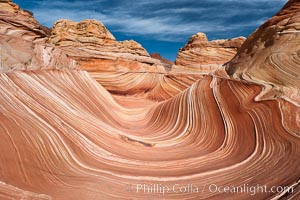
The Wave, an area of fantastic eroded sandstone featuring beautiful swirls, wild colors, countless striations, and bizarre shapes set amidst the dramatic surrounding North Coyote Buttes of Arizona and Utah. The sandstone formations of the North Coyote Buttes, including the Wave, date from the Jurassic period. Managed by the Bureau of Land Management, the Wave is located in the Paria Canyon-Vermilion Cliffs Wilderness and is accessible on foot by permit only.
Location: North Coyote Buttes, Paria Canyon-Vermilion Cliffs Wilderness, Arizona
Image ID: 20605
Location: North Coyote Buttes, Paria Canyon-Vermilion Cliffs Wilderness, Arizona
Image ID: 20605
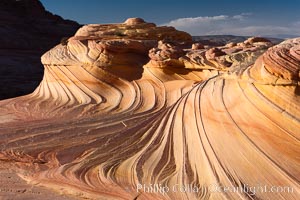
The Second Wave at Sunset, North Coyote Buttes. The Second Wave, a curiously-shaped sandstone swirl, takes on rich warm tones and dramatic shadowed textures at sunset. Set in the North Coyote Buttes of Arizona and Utah, the Second Wave is characterized by striations revealing layers of sedimentary deposits, a visible historical record depicting eons of submarine geology.
Location: North Coyote Buttes, Paria Canyon-Vermilion Cliffs Wilderness, Arizona
Image ID: 20606
Location: North Coyote Buttes, Paria Canyon-Vermilion Cliffs Wilderness, Arizona
Image ID: 20606
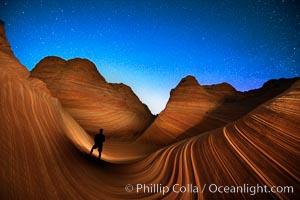
The Wave at Night, under a clear night sky full of stars. Photographer is illuminating the striated rocks with a small handheld light. The Wave, an area of fantastic eroded sandstone featuring beautiful swirls, wild colors, countless striations, and bizarre shapes is set amidst the dramatic surrounding North Coyote Buttes of Arizona and Utah. The sandstone formations of the North Coyote Buttes, including the Wave, date from the Jurassic period. Managed by the Bureau of Land Management, the Wave is located in the Paria Canyon-Vermilion Cliffs Wilderness and is accessible on foot by permit only.
Location: North Coyote Buttes, Paria Canyon-Vermilion Cliffs Wilderness, Arizona
Image ID: 28620
Location: North Coyote Buttes, Paria Canyon-Vermilion Cliffs Wilderness, Arizona
Image ID: 28620
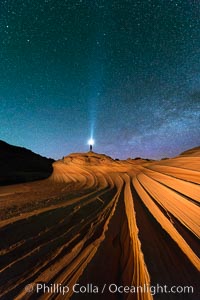
The Second Wave at Night. The Second Wave, a spectacular sandstone formation in the North Coyote Buttes, lies under a sky full of stars.
Location: North Coyote Buttes, Paria Canyon-Vermilion Cliffs Wilderness, Arizona
Image ID: 28627
Location: North Coyote Buttes, Paria Canyon-Vermilion Cliffs Wilderness, Arizona
Image ID: 28627
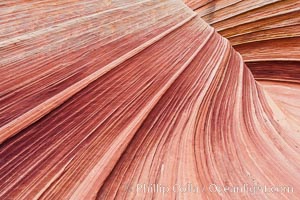
The Wave, an area of fantastic eroded sandstone featuring beautiful swirls, wild colors, countless striations, and bizarre shapes set amidst the dramatic surrounding North Coyote Buttes of Arizona and Utah. The sandstone formations of the North Coyote Buttes, including the Wave, date from the Jurassic period. Managed by the Bureau of Land Management, the Wave is located in the Paria Canyon-Vermilion Cliffs Wilderness and is accessible on foot by permit only.
Location: North Coyote Buttes, Paria Canyon-Vermilion Cliffs Wilderness, Arizona
Image ID: 20607
Location: North Coyote Buttes, Paria Canyon-Vermilion Cliffs Wilderness, Arizona
Image ID: 20607
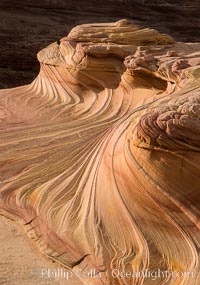
The Second Wave at Sunset, Vermillion Cliffs. The Second Wave, a curiously-shaped sandstone swirl, takes on rich warm tones and dramatic shadowed textures at sunset. Set in the North Coyote Buttes of Arizona and Utah, the Second Wave is characterized by striations revealing layers of sedimentary deposits, a visible historical record depicting eons of submarine geology.
Location: North Coyote Buttes, Paria Canyon-Vermilion Cliffs Wilderness, Arizona
Image ID: 28613
Location: North Coyote Buttes, Paria Canyon-Vermilion Cliffs Wilderness, Arizona
Image ID: 28613
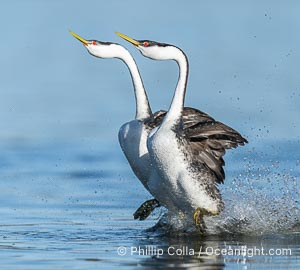
Two Western Grebes Walk on Water. Grebe rushing, a courtship behavior, happens when the birds slap the lake surface up to 20 times per second, literally running across the water.
Species: Western Grebe, Aechmophorus occidentalis
Location: Lake Wohlford, Escondido, California
Image ID: 40887
Species: Western Grebe, Aechmophorus occidentalis
Location: Lake Wohlford, Escondido, California
Image ID: 40887
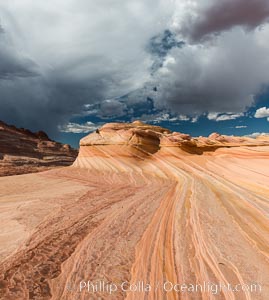
The Second Wave at sunset. The Second Wave, a curiously-shaped sandstone swirl, takes on rich warm tones and dramatic shadowed textures at sunset. Set in the North Coyote Buttes of Arizona and Utah, the Second Wave is characterized by striations revealing layers of sedimentary deposits, a visible historical record depicting eons of submarine geology.
Location: North Coyote Buttes, Paria Canyon-Vermilion Cliffs Wilderness, Arizona
Image ID: 28614
Location: North Coyote Buttes, Paria Canyon-Vermilion Cliffs Wilderness, Arizona
Image ID: 28614
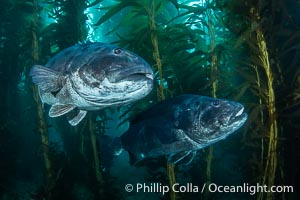
Two Giant Black Sea Bass in a Courtship Posture, in Kelp at Catalina Island. In summer months, black seabass gather in kelp forests in California to form mating aggregations. Courtship behaviors include circling of pairs of giant sea bass, production of booming sounds by presumed males, and nudging of females by males in what is though to be an effort to encourage spawning.
Species: Giant black sea bass, Stereolepis gigas
Location: Catalina Island, California
Image ID: 39432
Species: Giant black sea bass, Stereolepis gigas
Location: Catalina Island, California
Image ID: 39432
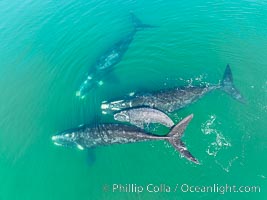
Mother and calf southern right whales are seen here as part of a larger courtship group, with adult males interested in mating with the mother. The calf has no choice but to stay by her mother's side during the courting activities.
Species: Southern Right Whale, Eubalaena australis
Location: Puerto Piramides, Chubut, Argentina
Image ID: 38381
Species: Southern Right Whale, Eubalaena australis
Location: Puerto Piramides, Chubut, Argentina
Image ID: 38381
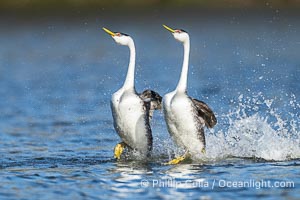
Western Grebes rushing across Lake Wohlford, exhibiting a spectacular courtship behavior in which the aquatic birds literally run across the surface of the water while their feet hit the water up to 20 times per second.
Species: Western Grebe, Aechmophorus occidentalis
Location: Lake Wohlford, Escondido, California
Image ID: 40840
Species: Western Grebe, Aechmophorus occidentalis
Location: Lake Wohlford, Escondido, California
Image ID: 40840
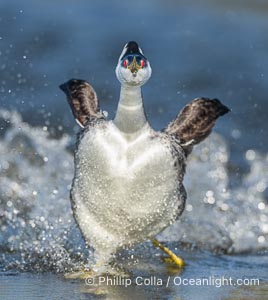
Extreme closeup view of a Western Grebe as it rushes, running across the water as part of an elaborate courtship behavior.
Species: Western Grebe, Aechmophorus occidentalis
Location: Lake Wohlford, Escondido, California
Image ID: 40841
Species: Western Grebe, Aechmophorus occidentalis
Location: Lake Wohlford, Escondido, California
Image ID: 40841
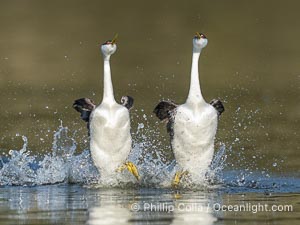
Two Western Grebes in a Spectacular Rush Across the Surface of Lake Wohlford. Rushing is a courtship behavior among grebes and requires the aquatic birds to step as rapidly as 20 beats per second to walk across water in this way. Simply amazing.
Species: Western Grebe, Aechmophorus occidentalis
Location: Lake Wohlford, Escondido, California
Image ID: 40866
Species: Western Grebe, Aechmophorus occidentalis
Location: Lake Wohlford, Escondido, California
Image ID: 40866
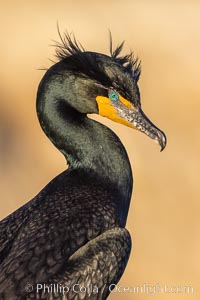
Double-crested cormorant nuptial crests, tufts of feathers on each side of the head, plumage associated with courtship and mating.
Species: Double-crested cormorant, Phalacrocorax auritus
Location: La Jolla, California
Image ID: 36845
Species: Double-crested cormorant, Phalacrocorax auritus
Location: La Jolla, California
Image ID: 36845
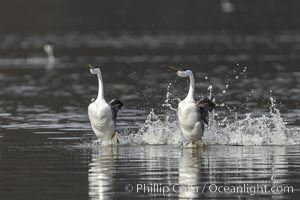
Western Grebes rushing in a courtship display. Rushing grebes run across the water 60 feet (20m) or further with their feet hitting the water as rapidly as 20 times per second. Lake Hodges, San Diego.
Species: Western grebe, Aechmophorus occidentalis
Image ID: 36888
Species: Western grebe, Aechmophorus occidentalis
Image ID: 36888
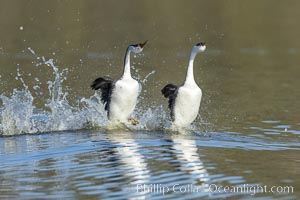
Western Grebes rushing in a courtship display. Rushing grebes run across the water 60 feet (20m) or further with their feet hitting the water as rapidly as 20 times per second.
Species: Western grebe, Aechmophorus occidentalis
Location: Lake Hodges, San Diego, California
Image ID: 37850
Species: Western grebe, Aechmophorus occidentalis
Location: Lake Hodges, San Diego, California
Image ID: 37850
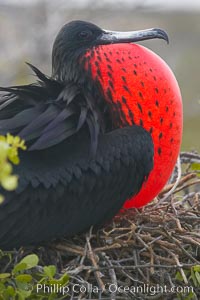
Magnificent frigatebird, adult male on nest, with throat pouch inflated, a courtship display to attract females.
Species: Magnificent frigatebird, Fregata magnificens
Location: North Seymour Island, Galapagos Islands, Ecuador
Image ID: 16725
Species: Magnificent frigatebird, Fregata magnificens
Location: North Seymour Island, Galapagos Islands, Ecuador
Image ID: 16725
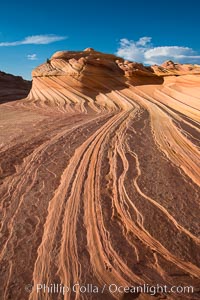
The Second Wave at Sunset, Vermillion Cliffs. The Second Wave, a curiously-shaped sandstone swirl, takes on rich warm tones and dramatic shadowed textures at sunset. Set in the North Coyote Buttes of Arizona and Utah, the Second Wave is characterized by striations revealing layers of sedimentary deposits, a visible historical record depicting eons of submarine geology.
Location: North Coyote Buttes, Paria Canyon-Vermilion Cliffs Wilderness, Arizona
Image ID: 28619
Location: North Coyote Buttes, Paria Canyon-Vermilion Cliffs Wilderness, Arizona
Image ID: 28619
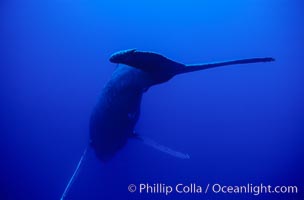
Adult male humpback whale singing, suspended motionless underwater. Only male humpbacks have been observed singing. All humpbacks in the North Pacific sing the same whale song each year, and the song changes slightly from one year to the next.
Species: Humpback whale, Megaptera novaeangliae
Location: Maui, Hawaii
Image ID: 02796
Species: Humpback whale, Megaptera novaeangliae
Location: Maui, Hawaii
Image ID: 02796
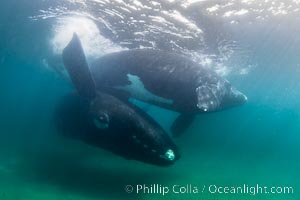
Male and female southern right whales mating underwater, Eubalaena australis. The male positions himself below the female and turns upside down, so the two whales are belly-to-belly and can mate. Sand has been stirred up by the courtship activities and the water is turbid.
Species: Southern Right Whale, Eubalaena australis
Location: Puerto Piramides, Chubut, Argentina
Image ID: 38291
Species: Southern Right Whale, Eubalaena australis
Location: Puerto Piramides, Chubut, Argentina
Image ID: 38291
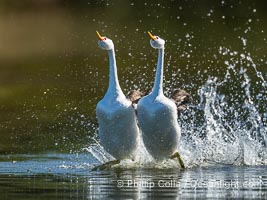
Clark's Grebes rushing side by side, a spectacular courtship behavior in which the aquatic birds literally run on the surface of the water while slapping their feet up to 20 times per second.
Species: Clark's Grebe, Aechmophorus clarkii
Location: Lake Wohlford, Escondido, California
Image ID: 40911
Species: Clark's Grebe, Aechmophorus clarkii
Location: Lake Wohlford, Escondido, California
Image ID: 40911
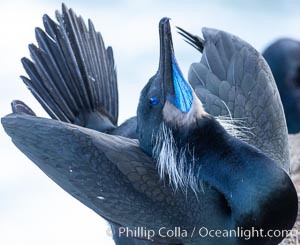
Male Brandt's Cormorant Skypointing, Courtship Display, Breeding Plumage with blue throat and white pin-feathers, La Jolla. Skypointing is an interesting courtship behavior that many birds practice. Among Brandt's Cormorants the male performs this, likely as a way of attracting a mate to the nest he has built by showing off his striking blue throat. He tips his head backward showing off his striking blue throat, and partially raises his wings. Seen here on seacliffs above the ocean.
Species: Brandt's cormorant, Phalacrocorax penicillatus
Image ID: 36801
Species: Brandt's cormorant, Phalacrocorax penicillatus
Image ID: 36801
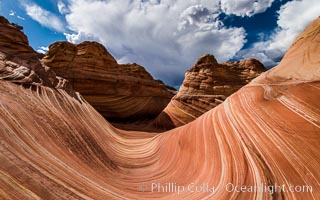
The Wave in the North Coyote Buttes, an area of fantastic eroded sandstone featuring beautiful swirls, wild colors, countless striations, and bizarre shapes set amidst the dramatic surrounding North Coyote Buttes of Arizona and Utah. The sandstone formations of the North Coyote Buttes, including the Wave, date from the Jurassic period. Managed by the Bureau of Land Management, the Wave is located in the Paria Canyon-Vermilion Cliffs Wilderness and is accessible on foot by permit only.
Location: North Coyote Buttes, Paria Canyon-Vermilion Cliffs Wilderness, Arizona
Image ID: 28601
Location: North Coyote Buttes, Paria Canyon-Vermilion Cliffs Wilderness, Arizona
Image ID: 28601
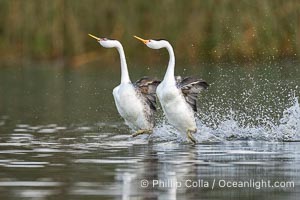
An unusual mixed-species pair of grebes rushing, Western Grebe on left and Clark's Grebe on right. In this spectacular courtship behavior, the grebes beat their feet so rapidly they literally run over the surface of the water.
Species: Western Grebe, Clark's Grebe, Aechmophorus occidentalis, Aechmophorus clarkii
Location: Lake Wohlford, Escondido, California
Image ID: 40848
Species: Western Grebe, Clark's Grebe, Aechmophorus occidentalis, Aechmophorus clarkii
Location: Lake Wohlford, Escondido, California
Image ID: 40848
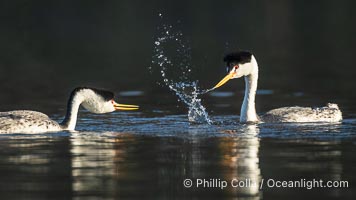
Clark's Grebes Dip Shaking, a courtship behavior in which the grebes face each other and alternate dipping their beaks in the water and shaking their head, tossing water into the air. Coupled with ratchet-pointing, several rounds of dip-shaking are often an immediate precursor to rushing.
Species: Clark's Grebe, Aechmophorus clarkii
Location: Lake Wohlford, Escondido, California
Image ID: 40888
Species: Clark's Grebe, Aechmophorus clarkii
Location: Lake Wohlford, Escondido, California
Image ID: 40888
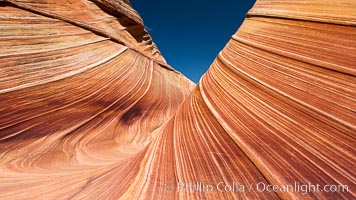
The Wave, an area of fantastic eroded sandstone featuring beautiful swirls, wild colors, countless striations, and bizarre shapes set amidst the dramatic surrounding North Coyote Buttes of Arizona and Utah. The sandstone formations of the North Coyote Buttes, including the Wave, date from the Jurassic period. Managed by the Bureau of Land Management, the Wave is located in the Paria Canyon-Vermilion Cliffs Wilderness and is accessible on foot by permit only.
Location: North Coyote Buttes, Paria Canyon-Vermilion Cliffs Wilderness, Arizona
Image ID: 20608
Location: North Coyote Buttes, Paria Canyon-Vermilion Cliffs Wilderness, Arizona
Image ID: 20608
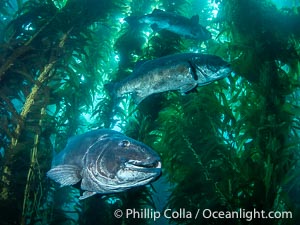
Three Giant Black Sea Bass in a Courtship Posture, Hovering One Above the Other in Kelp at Catalina Island. In summer months, black seabass gather in kelp forests in California to form mating aggregations. Courtship behaviors include circling of pairs of giant sea bass, production of booming sounds by presumed males, and nudging of females by males in what is though to be an effort to encourage spawning.
Species: Giant black sea bass, Stereolepis gigas
Location: Catalina Island, California
Image ID: 39434
Species: Giant black sea bass, Stereolepis gigas
Location: Catalina Island, California
Image ID: 39434
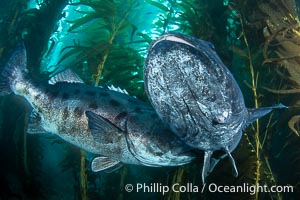
A male giant sea bass nudges a female giant sea bass to encourage spawning as they swim in a tight circle. This courting pair of giant sea bass is deep in the kelp forest at Catalina Island. In summer months, giant sea bass gather in kelp forests in California to form courtship and mating aggregations, eventually leading to spawning.
Species: Giant black sea bass, Stereolepis gigas
Location: Catalina Island, California
Image ID: 39435
Species: Giant black sea bass, Stereolepis gigas
Location: Catalina Island, California
Image ID: 39435
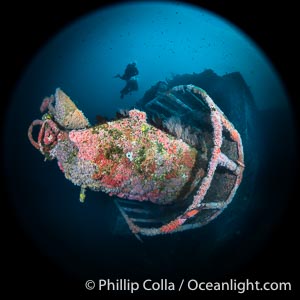
Divers Swim Over the Wreck of the HMCS Yukon in San Diego. Deliberately sunk in 2000 at San Diego's Wreck Alley to form an artifical reef, the HMCS Yukon is a 366-foot-long former Canadian destroyer. It is encrusted with a variety of invertebrate life, including Cornyactis anemones which provide much of the color seen here.
Location: San Diego, California
Image ID: 39474
Location: San Diego, California
Image ID: 39474
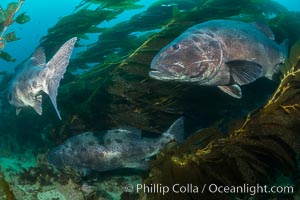
Three giant black sea bass, gathering in a mating/courtship aggregation amid kelp forest at Catalina Island. In summer months, black seabass gather in kelp forests in California to form mating aggregations. Courtship behaviors include circling of pairs of giant sea bass, production of booming sounds by presumed males, and nudging of females by males in what is though to be an effort to encourage spawning.
Species: Giant black sea bass, Stereolepis gigas
Location: Catalina Island, California
Image ID: 33355
Species: Giant black sea bass, Stereolepis gigas
Location: Catalina Island, California
Image ID: 33355